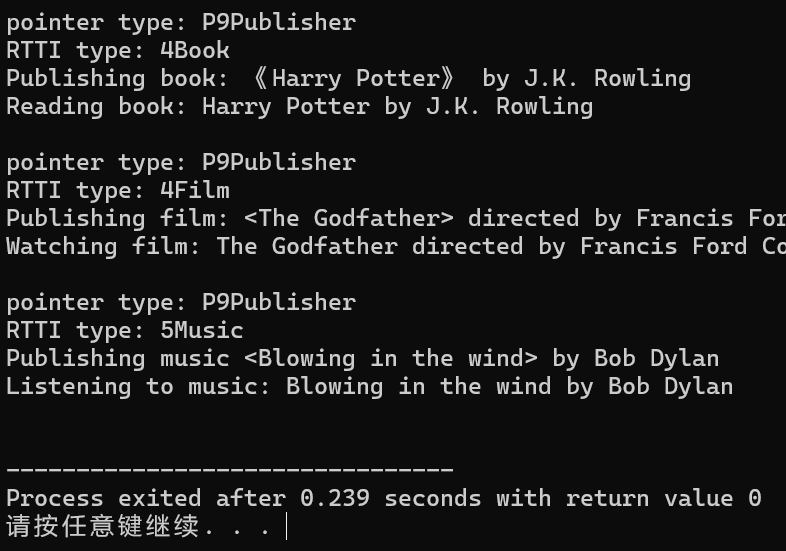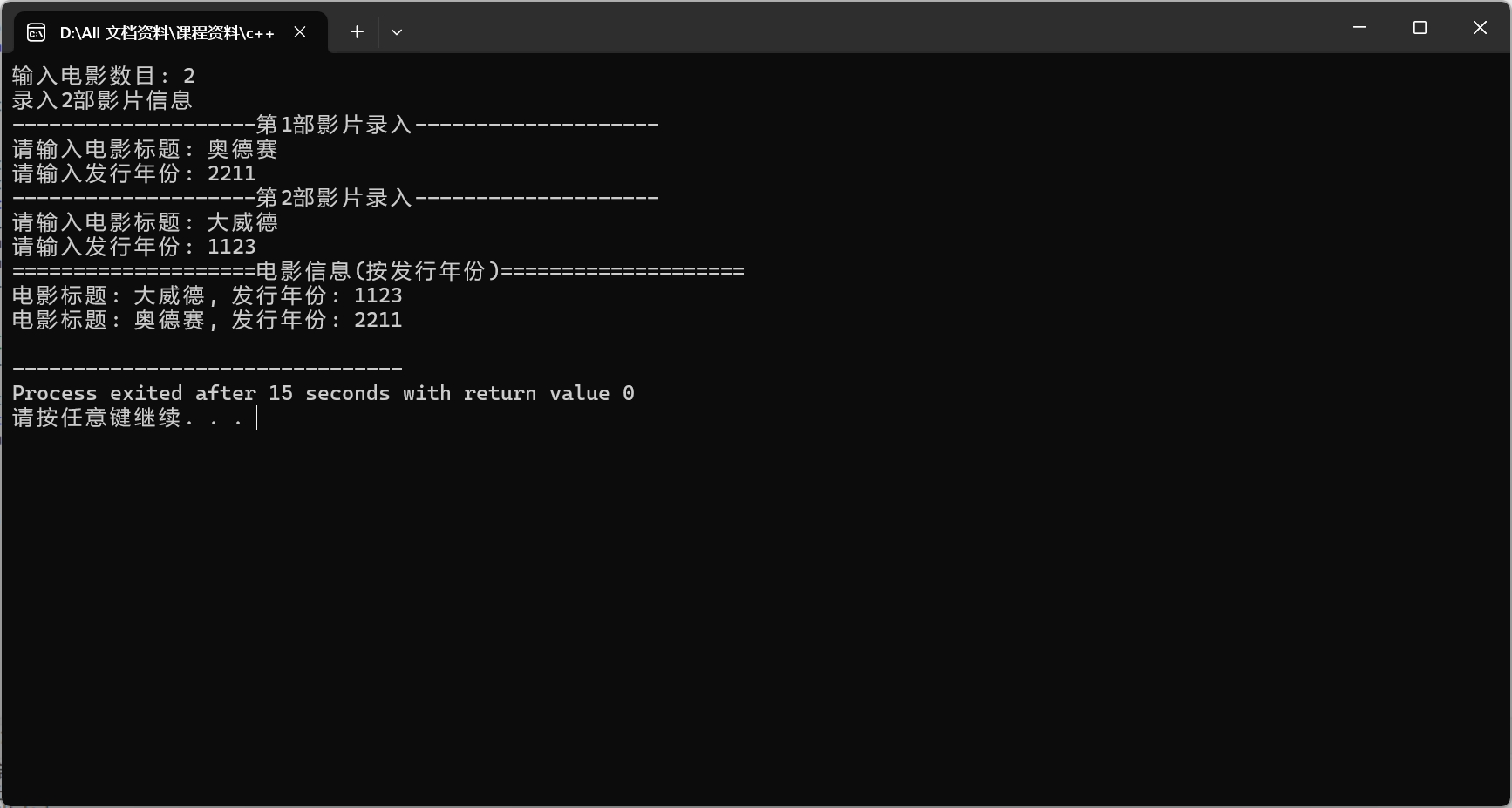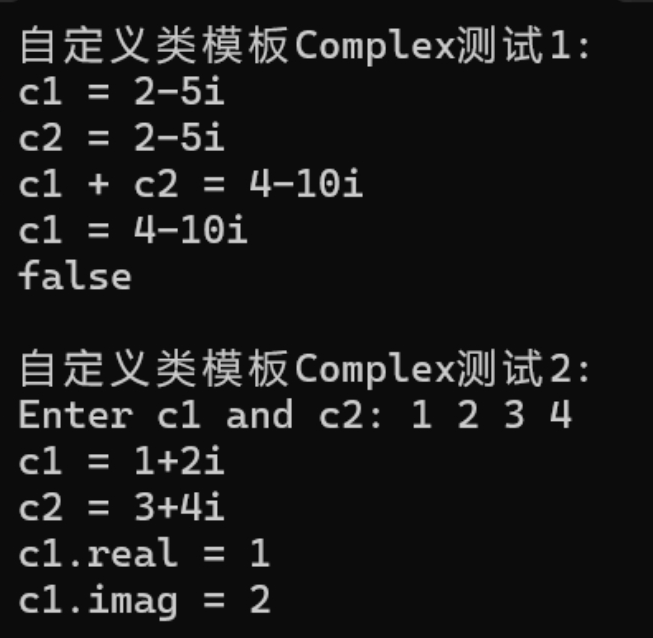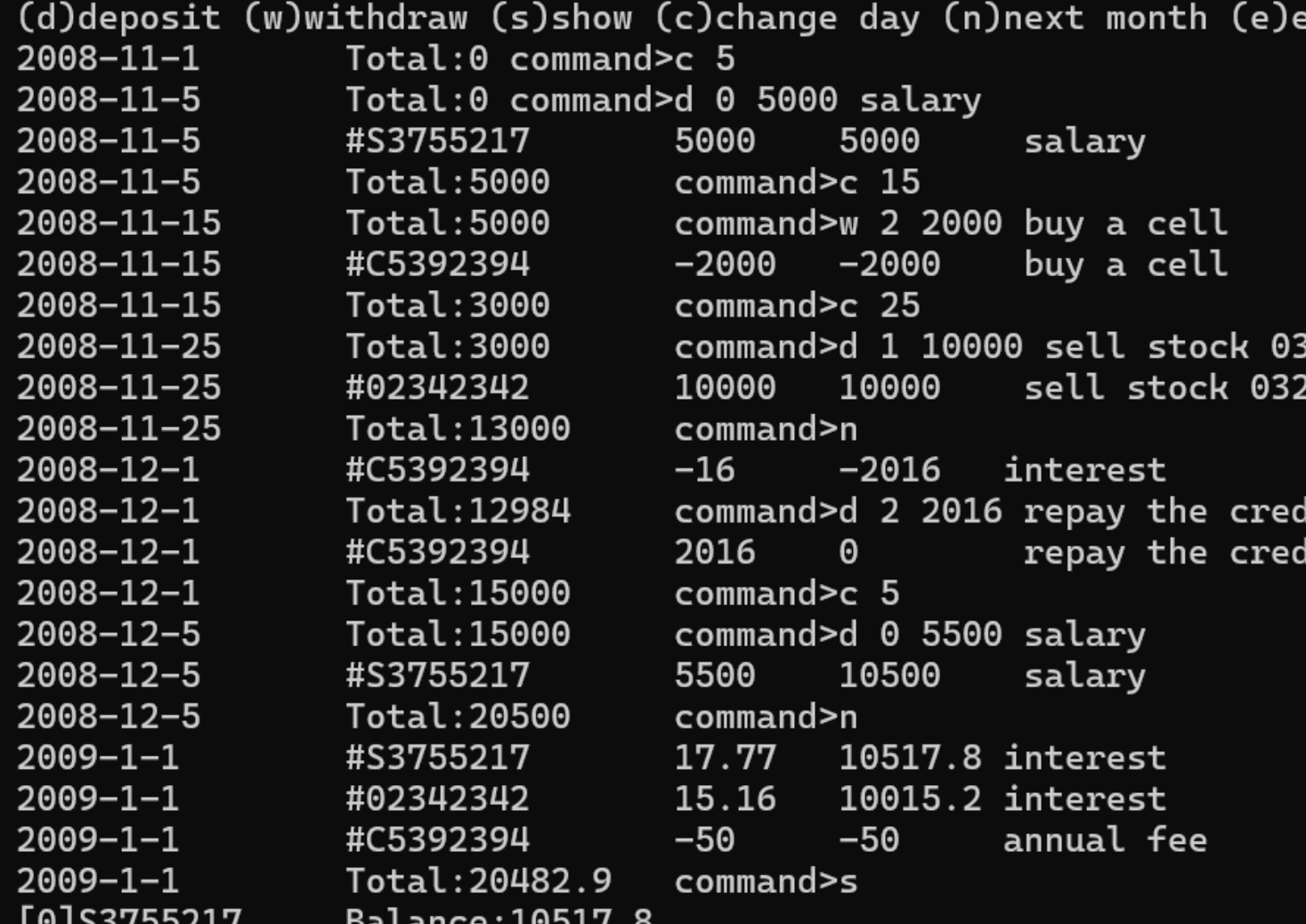实验5 继承和多态
一、实验目的
- 正确使用C++语法定义和使用派生类
1. 正确使用C++语法重载运算符,理解编译器是如何将表达式转换为对运算符重载函数的调用的
2. 基于问题场景,合理使用派生机制、虚函数、纯虚函数、抽象类,实现接口继承与运行时多态
3. 能灵活应用类的组合、继承、多态编程解决实际问题
二、实验内容
1. 实验任务1
publisher.hpp
#pragma once #include <iostream> #include <string> using std::cout; using std::endl; using std::string; // 发行/出版物类:Publisher (抽象类) class Publisher { public: Publisher(const string &s = ""); // 构造函数 public: virtual void publish() const = 0; // 纯虚函数,作为接口继承 virtual void use() const = 0; // 纯虚函数,作为接口继承 protected: string name; // 发行/出版物名称 }; Publisher::Publisher(const string &s): name {s} { } // 图书类: Book class Book: public Publisher { public: Book(const string &s = "", const string &a = ""); // 构造函数 public: void publish() const override; // 接口 void use() const override; // 接口 private: string author; // 作者 }; Book::Book(const string &s, const string &a): Publisher{s}, author{a} { } void Book::publish() const { cout << "Publishing book: 《" << name << "》 by " << author << endl; } void Book::use() const { cout << "Reading book: " << name << " by " << author << endl; } // 电影类: Film class Film: public Publisher { public: Film(const string &s = "", const string &d = ""); // 构造函数 public: void publish() const override; // 接口 void use() const override; // 接口 private: string director; // 导演 }; Film::Film(const string &s, const string &d): Publisher{s}, director{d} { } void Film::publish() const { cout << "Publishing film: <" << name << "> directed by " << director << endl; } void Film::use() const { cout << "Watching film: " << name << " directed by " << director << endl; } // 音乐类:Music class Music: public Publisher { public: Music(const string &s = "", const string &a = ""); public: void publish() const override; // 接口 void use() const override; // 接口 private: string artist; // 音乐艺术家名称 }; Music::Music(const string &s, const string &a): Publisher{s}, artist{a} { } void Music::publish() const { cout << "Publishing music <" << name << "> by " << artist << endl; } void Music::use() const { cout << "Listening to music: " << name << " by " << artist << endl; }
task1.cpp
#include "publisher.hpp" #include <vector> #include <typeinfo> using std::vector; void test() { vector<Publisher *> v; v.push_back(new Book("Harry Potter", "J.K. Rowling")); v.push_back(new Film("The Godfather", "Francis Ford Coppola")); v.push_back(new Music("Blowing in the wind", "Bob Dylan")); for(auto &ptr: v) { cout << "pointer type: " << typeid(ptr).name() << endl; // 输出指针类型 cout << "RTTI type: " << typeid(*ptr).name() << endl; // 输出指针指向的对象类型 ptr->publish(); ptr->use(); cout << endl; } } int main() { test(); }
运行结果:

- ptr是指向基类Publisher的指针变量。
- ptr指向的对象( *ptr )的类型,是在运行时确定的。通过在基类中使用虚函数实现在运行时根据指针实际指向的对象调用相应的 publish 和 use 实现代码。
2. 实验任务2
book.hpp
#pragma once #include <string> #include <iostream> #include <iomanip> using std::string; using std::ostream; using std::endl; using std::setw; using std::left; class Book { public: Book(const string &name, const string &author, const string &translator, const string &isbn, float price); friend ostream& operator<<(ostream &out, const Book &book); private: string name; // 书名 string author; // 作者 string translator; // 译者 string isbn; // isbn号 float price; // 定价 }; // 成员函数实现 Book::Book(const string &name, const string &author, const string &translator, const string &isbn, float price) { this->name = name; this->author = author; this->translator = translator; this->isbn = isbn; this->price = price; } // 友元实现 ostream& operator<<(ostream &out, const Book &book) { out << left; out << setw(15) << "书名:" << book.name << endl << setw(15) << "作者:" << book.author << endl << setw(15) << "译者:" << book.translator << endl << setw(15) << "ISBN:" << book.isbn << endl << setw(15) << "定价:" << book.price; return out; }
booksale.hpp
#pragma once #include "book.hpp" #include <iostream> #include <string> #include <iomanip> using std::string; using std::cout; using std::endl; using std::setw; class BookSale { public: BookSale(const Book &b, float price, int amount); int get_amount() const; friend ostream& operator<<(ostream &out, const BookSale &item); private: Book rb; float sales_price; // 售价 int sales_amount; // 销售数量 float revenue; // 营收 }; // 成员函数实现 BookSale::BookSale(const Book &b, float price, int amount): rb{b}, sales_price(price), sales_amount{amount} { revenue = sales_amount * sales_price; } int BookSale::get_amount() const { return sales_amount; } // 友元函数实现 ostream& operator<<(ostream &out, const BookSale &item) { out << left; out << item.rb << endl << setw(15) << "售价:" << item.sales_price << endl << setw(15) << "销售数量:" << item.sales_amount << endl << setw(15) << "营收:" << item.revenue; return out; }
task2.cpp
#include "booksale.hpp" #include <iostream> #include <string> #include <vector> #include <algorithm> // 按图书销售数额比较 bool compare_by_amount(const BookSale &x1, const BookSale &x2) { return x1.get_amount() > x2.get_amount(); } void test() { using namespace std; vector<BookSale> sales_lst; // 存放图书销售记录 int books_number; cout << "录入图书数量: "; cin >> books_number; cout << "录入图书销售记录" << endl; for(int i = 0; i < books_number; ++i) { string name, author, translator, isbn; float price; cout << string(20, '-') << "第" << i+1 << "本图书信息录入" << string(20, '-') << endl; cout << "录入书名: "; cin >> name; cout << "录入作者: "; cin >> author; cout << "录入译者: "; cin >> translator; cout << "录入isbn: "; cin >> isbn; cout << "录入定价: "; cin >> price; Book book(name, author, translator, isbn, price); float sales_price; int sales_amount; cout << "录入售价: "; cin >> sales_price; cout << "录入销售数量: "; cin >> sales_amount; BookSale record(book, sales_price, sales_amount); sales_lst.push_back(record); } // 按销售册数排序 sort(sales_lst.begin(), sales_lst.end(), compare_by_amount); // 按销售册数降序输出图书销售信息 cout << string(20, '=') << "图书销售统计" << string(20, '=') << endl; for(auto &t: sales_lst) { cout << t << endl; cout << string(40, '-') << endl; } } int main() { test(); }
运行结果:

3. 实验任务3
pets.hpp
#include <string> #include <iostream> using namespace std; class MachinePets { public: virtual ~MachinePets() = default; virtual string get_nickname() const = 0; virtual string talk() const = 0; }; class PetCats : public MachinePets { private: string nickname; public: PetCats(const string& name) : nickname(name) {} string get_nickname() const override { return nickname; } string talk() const override { return "Meow"; } }; class PetDogs : public MachinePets { private: string nickname; public: PetDogs(const string& name) : nickname(name) {} string get_nickname() const override { return nickname; } string talk() const override { return "Woof"; } };
task3.cpp
#include <iostream> #include <vector> #include "pets.hpp" void test() { using namespace std; vector<MachinePets *> pets; pets.push_back(new PetCats("miku")); pets.push_back(new PetDogs("da huang")); for(auto &ptr: pets) cout <<ptr->get_nickname() << " says " << ptr->talk() << endl; } int main() { test(); }
运行结果:

4. 实验任务4
film.hpp
#include <iostream> #include <string> using namespace std; class Film{ private: string title; int year; public: Film(string t="", int y=0):title(t), year(y){} int getYear() const { return year; } friend istream& operator>>(istream& in, Film& film) { cout << "请输入电影标题: "; in >> std::ws; getline(in, film.title); cout << "请输入发行年份: "; in >> film.year; return in; } friend ostream& operator<<(ostream& out, const Film& film) { out << "电影标题: " << film.title << ", 发行年份: " << film.year ; return out; } }; bool compare_by_year(const Film& f1, const Film& f2) { return f1.getYear() < f2.getYear(); }
task.cpp
#include "film.hpp" #include <iostream> #include <string> #include <vector> #include <algorithm> void test() { using namespace std; int n; cout << "输入电影数目: "; cin >> n; cout << "录入" << n << "部影片信息" << endl; vector<Film> film_lst; for(int i = 0; i < n; ++i) { Film f; cout << string(20, '-') << "第" << i+1 << "部影片录入" << string(20, '-') << endl; cin >> f; film_lst.push_back(f); } // 按发行年份升序排序 sort(film_lst.begin(), film_lst.end(), compare_by_year); cout << string(20, '=') + "电影信息(按发行年份)" + string(20, '=')<< endl; for(auto &f: film_lst) cout << f << endl; } int main() { test(); }

5. 实验任务5
Complex.hpp
#include <iostream> #include <string> using namespace std; template <typename T> class Complex { private: T real; T imag; public: Complex(double r = 0, double i = 0): real(r), imag(i) {} T get_real () const { return real; } T get_imag () const { return imag; } Complex operator+(const Complex& other) const { return Complex(real + other.real, imag + other.imag); } Complex& operator+=(const Complex& other) { real += other.real; imag += other.imag; return *this; } bool operator==(const Complex& other) const { return real == other.real && imag == other.imag; } friend istream& operator>>(istream& in, Complex& c) { in >> c.real >> c.imag; return in; } friend ostream& operator<<(ostream& out, const Complex& c) { out << "(" << c.real << " + " << c.imag << "i)"; return out; } };
task.cpp
#include "Complex.hpp" #include <iostream> using std::cin; using std::cout; using std::endl; using std::boolalpha; void test1() { Complex<int> c1(2, -5), c2(c1); cout << "c1 = " << c1 << endl; cout << "c2 = " << c2 << endl; cout << "c1 + c2 = " << c1 + c2 << endl; c1 += c2; cout << "c1 = " << c1 << endl; cout << boolalpha << (c1 == c2) << endl; } void test2() { Complex<double> c1, c2; cout << "Enter c1 and c2: "; cin >> c1 >> c2; cout << "c1 = " << c1 << endl; cout << "c2 = " << c2 << endl; cout << "c1.real = " << c1.get_real() << endl; cout << "c1.imag = " << c1.get_imag() << endl; } int main() { cout << "自定义类模板Complex测试1: " << endl; test1(); cout << endl; cout << "自定义类模板Complex测试2: " << endl; test2(); }

6. 实验任务6
date.h
//date.h #ifndef DATE_H #define DATE_H class Date { private: int year; int month; int day; int totalDays; public: Date(int year, int month, int day); int getYear()const { return year; } int getMonth()const { return month; } int getDay()const { return day; } int getMaxDay()const; bool isLeapYear()const { return (((year % 4 == 0) && (year % 100 != 0)) || (year % 400 == 0)); } void show()const; int operator-(const Date& date)const { return totalDays - date.totalDays; } }; #endif // DATE_H
date.cpp
#include"date.h" #include<iostream> #include<cstdlib> using namespace std; namespace { const int DAYS_BEFORE_MONTH[] = { 0, 31, 59, 90, 120, 151, 181, 212, 243, 273, 304, 334, 365 }; } Date::Date(int year, int month, int day) :year(year), month(month), day(day) { if (day <= 0 || day > getMaxDay()) { cout << "Invalid date!"; show(); cout << endl; exit(1); } int years = year - 1; totalDays = years * 365 + years / 4 - years / 100 + years / 400 + DAYS_BEFORE_MONTH[month - 1] + day; if (isLeapYear() && month > 2) totalDays++; } int Date::getMaxDay() const { if (isLeapYear() && month == 2) return 29; else return DAYS_BEFORE_MONTH[month] - DAYS_BEFORE_MONTH[month - 1]; } void Date::show() const { cout << getYear() << "-" << getMonth() << "-" << getDay(); }

在基类账户中将公共操作皆声明为虚函数,因此可以通过基类指针来执行各种操作,因而各种类型的账户对象都可以通过一个基类指针的数组来访问,这提供了极大的便利,使我们可以通过统一的方式来操作各个账户,因而从cin输入所执行的操作就变得非常方便了。
在本例的主程序中我们必须将几个账户的构造在程序中写死,而不允许用户随时动态的添加新的账户。


 浙公网安备 33010602011771号
浙公网安备 33010602011771号